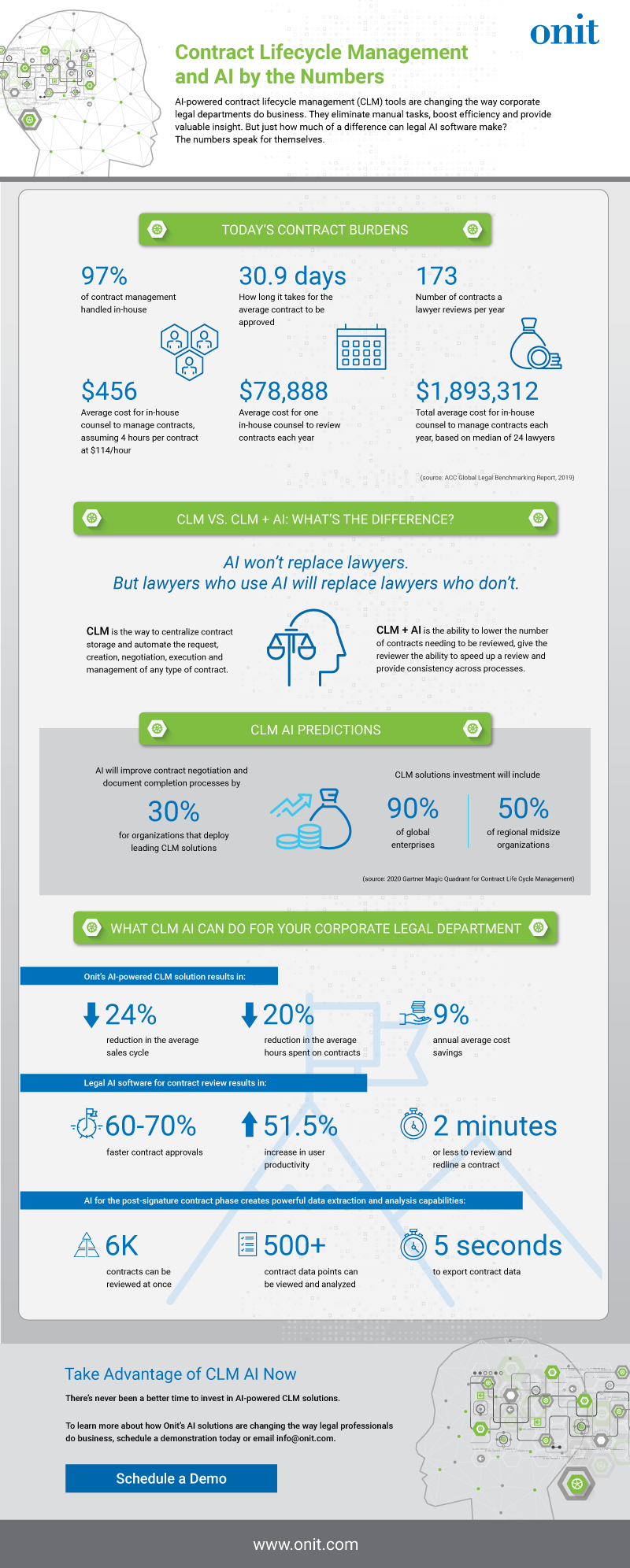
Many sales, procurement and corporate legal departments struggle with contract management issues. The issues may seem mundane – too much manual work, a lack of visibility or slow responses – but together, the issues collectively (and quickly) slow down valuable revenue-generating efforts or can lead to regulatory breaches.
Comprehensive contract lifecycle management (CLM) solutions can defeat contract management issues by automating and standardizing processes and decreasing risk and manual work. They streamline the entire contract lifecycle and provide ease of use for all parties. With the ability to have unlimited users and an intuitive, user-friendly interface, these solutions dramatically improve supplier and vendor relationships and overall customer satisfaction.
How Your CLM Defeats Contract Management Issues
What should you look for in a CLM solution to overcome contract management issues? Consider this list of necessities.
- Automatically generate contracts – The CLM software should allow you to save time and reduce risk by automatically creating a contract with the appropriate clauses based on a robust rules engine and contract metadata.
- Work where you want to work – Most lawyers rely on Microsoft Word for contracts. An MS Word integration maintains seamless version control and secure links to the CLM software.
- Let stakeholders help themselves – With a self-service portal, partners and clients can quickly request, submit or create contracts. Contracts can be automatically assigned and tracked, increasing visibility and improving turnaround time.
- Reduce risks with less work – Manage and measure tasks or milestones related to compliance via a dedicated dashboard and reporting. Likewise, automated risk mitigation in a CLM identifies clauses and terms which add risk to your agreement and scores your contract repository to assist you in both negotiations and renegotiations.
- A quick time to value – A CLM solution on an advanced cloud platform means your CLM solution can be deployed in 30 days or less.
The Role of AI in Contract Lifecycle Management – And How it Helps You
In recent years, AI has taken businesses by storm, gaining recognition for its rapid evolution and considerable accomplishments. From driving cars to diagnosing illnesses, it continues to prove its value to all industries.
Contract management is no different. Sales, procurement and corporate legal departments have the opportunity to benefit from AI during the contract lifecycle, realizing increased efficiency from technology that not only understands their organization but learns and continually improves.
As you look for AI-based CLM tools, here is what you should expect in your chosen technology.
- Out-of-the-box functionality from day one – Your CLM AI should work for you from day one by being pretrained and coming with thousands of existing clauses created by legal experts.
- Faster review – Need a first-pass contract review in two minutes or less? Your CLM AI can do this, quashing some common contract management issues.
- Easy edit tracking –Open a contract in Word or PDF to view AI redlines with track changes and commentary.
- Checklists to streamline review – AI tracks and assigns alerts for reviewers with interactive, automated tasks within Microsoft Word.
- Identify negotiation positions – Obtain suggested primary and fallback positions directly connected to your checklists with AI.
- Empower users – Business professionals can get an AI-assisted review of standard contracts like NDAs through email or a self-service portal.
- Review in batches – AI can extract data from multiple legal documents at once for due diligence, applying contract updates or importing legacy contracts. You can also automate the batch review of contracts for routine legal due diligence, making time for higher-value M&A tasks.
- Accelerate repapering – AI will amend or redline contract details and key terms due to regulatory, policy or commercial changes or M&A activities.
- Quick analysis and management – Your CLM AI will identify key legal clauses, terms and details in documents. It can also analyze legacy contract metadata rapidly to extract critical dates, terms and clauses to assist in the import.
- Large-scale contract review – Audit compliance with AI during regulatory changes and export relevant details to .CSV reports and in-document notes.
The Results
How much of an impact can AI and CLM have on contract management issues? CLM solutions can help you save 9% annually, reduce the average sales cycle by 24% and reduce the average hours spent on contracts by 20% or more.
A study of how legal AI contract review software affects in-house lawyers’ productivity showed that new users were immediately 51.5% more productive and 34% more efficient. And with post-signature contract AI, you improve efficiency by increasing the amount of data analyzed while reviewing and exporting data in five seconds or less.
As an example, consider what CLM AI can do for non-disclosure agreements (NDAs). NDAs are the highest-volume contracts handled by businesses today, with our customers telling us that they process anywhere between 500 and 100,000 NDAs every year. Processing that volume of contracts, no matter how standardized or routine, quickly adds up in cost and creates a real risk of spreading your legal department employees too thin. However, applying AI and CLM best practices can automate NDA management and cut time spent on them by up to 70%. This blog post shows you how this works.
Reach out to us to learn more or schedule a demonstration of our contract lifecycle management and contract AI, including ReviewAI, ExtractAI and Automate NDA.












